The date of the First National Convention of the Solidarity Trade Union was approaching in Gdańsk. The convention was held in two rounds. Delegates of the “Sandomierz Land” Region, including delegates from Staszów, Bolesław Kozłowski and Józef Małobęcki, travelled to the first round of the convention by microbus from the Stalowa Wola Steelworks. They were also accompanied by the Chairman of “Solidarity Rural,” Jan Kozłowski, who was invited as a special guest of the congress.
Gdańsk welcomed the participants of the convention with great joy and enthusiasm visible on the entire route to the convention building i.e. the Olivia Hall in Gdańsk. Solidarity and national flags were hanging in windows and on balconies. From the windows of houses and blocks of flats people were waving their hands joyfully to greet the congress participants. The atmosphere of joy and freedom was clearly felt. It was a unique patriotic and liberation elation and satisfaction from leading to a fully democratically elected congress of the first organization independent from communists in the history of the People’s Republic of Poland.
This joy was not spoiled by the tension resulting from increased police patrols around the Olivia Hall and on the main access streets to the Olivia. The convention was inaugurated in the Oliwa Cathedral with a solemn Holy Mass celebrated by the Primate of Poland, Cardinal Józef Glemp. The solemn entrance of the cardinal accompanied by the chairman of NSZZ “Solidarity,” Lech Wałęsa, became the apogee of patriotic and freedom elation of the convention participants.
Leading to the congress, despite countless provocations and threats from the communists, was a symbolic clasp linking the period of creating and building the strength of the union from its inception and all the previous uprisings of the nation against communist power. The achieved goal, even in the face of further unforeseeable events, left another trace in the national consciousness and the will to continue the process of freedom that had begun
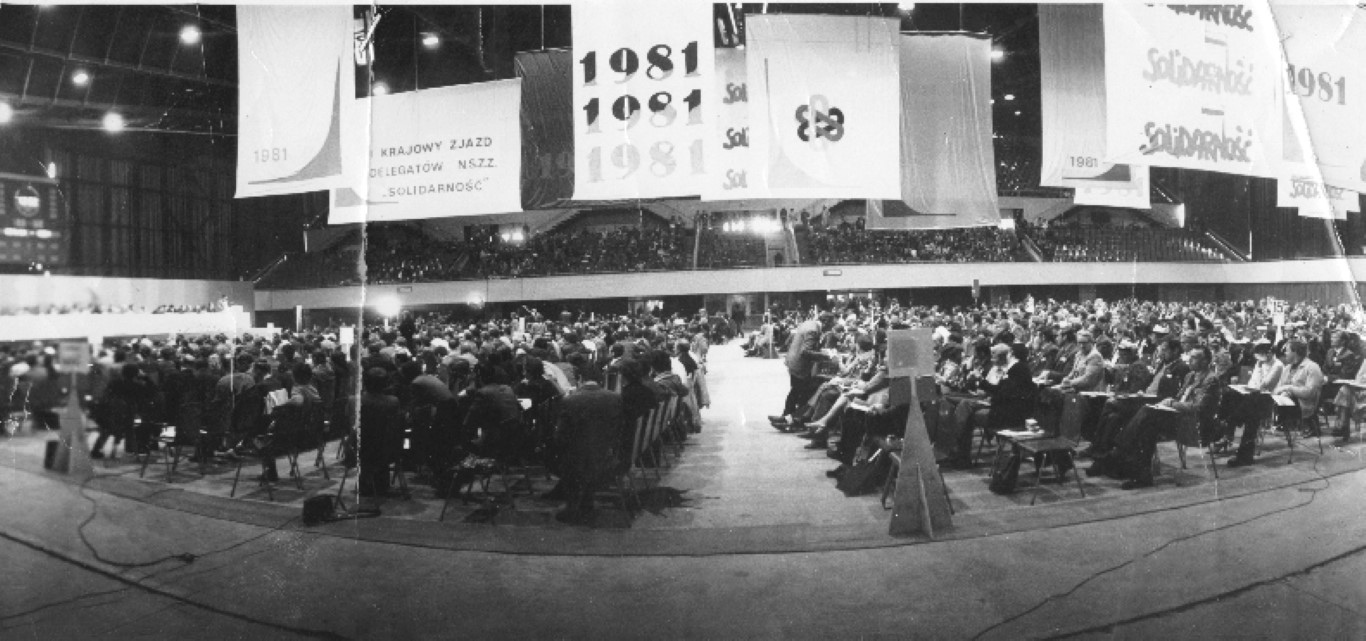
The Congress hall in Olivia in Gdańsk. In the second row from the passage the delegation of “Sandomierz Land” and B. Kozłowski in conversation with J. Małobęcki.
He union’s authorities, elected by the congress, were to operate in a different reality as authorities constituted by free, fully democratic elections. In gratitude for the admirable attitude of support and assistance for the held convention, the trade unionists expressed their gratitude to the residents of the Tri-City by a special convention resolution. Due to the fact that the first round of the convention took place during the period of the anniversary of Nazi Germany’s attack on Poland, it was decided to lay wreaths on the monuments of Gdańsk, Gdynia and Westerplatte in tribute to the sacrifice of those who gave their lives on the Gdańsk Coast in the fight for a free and just Poland.
In the first round of the convention, delegates passed several important resolutions, including:
- The convention’s opposition to the Communists’ attempts to change the Trade Union Act, despite previous agreements with the union.
- Calling on members of the convention to defend the Workers’ Self-Government, which the authorities have tried to nip in the bud by depriving the self-government of, among others, the right to appoint and dismiss directors.
- Resolution in the interest of educating young generations in the spirit of truth and national tradition.
- Resolution concerning a person’s personal freedom, expressing his or her will to, among others, freedom of movement, including the choice to emigrate and return from it without the use of manipulative intimidating methods.
The Convention could not ignore the great and important role played at that time by the Polish Pope John Paul II. In gratitude for all that John Paul II has done for the Polish nation, the Convention sent him a letter of thanks.
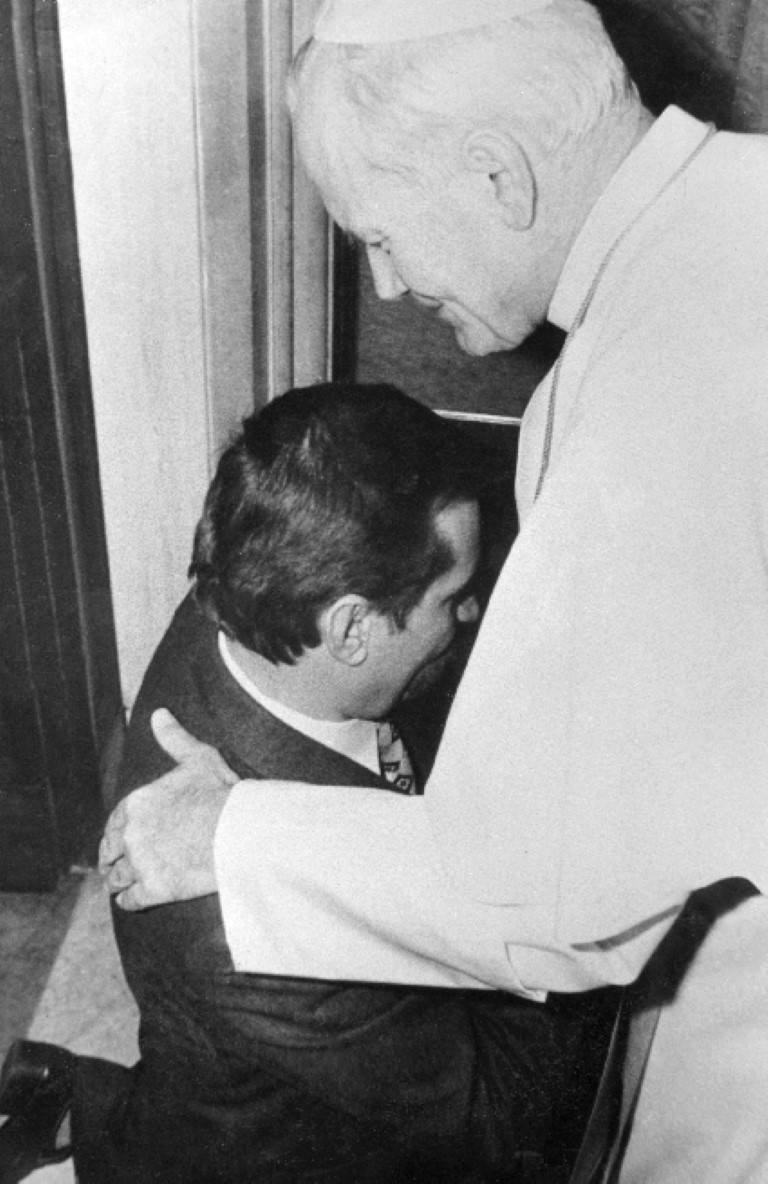
Lech Wałęsa with Pope John Paul II in the spring of 1981.
In addition to the above-mentioned resolutions, the first round of the meeting focused primarily on a discussion of the target statute of the Solidarity Trade Union. The debates were very stormy and chaotic, as it often happens in a fledgling democracy. Countless procedural motions and proposals came from every region. There were also off-the-record discussions, advice from experts and consultants, and conflicting views that were difficult to overcome. The communists in the entire Soviet bloc were enraged by the message of the first congress of NSZZ Solidarity delegates to the working people of Eastern Europe. In this message the delegates set out the union’s goals and support for those who would take on the difficult struggle for a free trade union movement in their own countries.
The communist campaign in all mass media as well as in the communist press was unprecedented. The union was accused of interfering in the internal affairs of the allied countries and even of violating international law by doing so. The congress established problem committees for the period between rounds, obliging them to present framework conclusions and findings for the congress in its second round.
The second round took place at the end of September and the beginning of October 1981. This time Józef Małobęcki and Bolesław Kozłowski went to Gdańsk by bus from the “Świętokrzyska Land” region. This round consisted mainly of the statute resolution, the program resolution and the election of supreme authorities of the Solidarity Trade Union. The statute of the union passed by the congress did not differ from the previous statute prepared by Wiesław Chrzanowski and Jan Olszewski.
The enormity of communist negligence in all areas of the nation’s and state’s functioning meant that the stance of the NSZZ (Independent, Self-Governing Trade Union) “Solidarity” convention should have at least given a framework answer to the problems troubling the country. That answer was contained in the programme resolution of the 1st National Delegates’ Convention of the Independent Self-Governing Trade Union “Solidarity.” The programme was divided into 7 basic problem blocks comprising a total of 37 theses with an annex.
The problem blocks were presented as follows:
- Who we are and where we are aiming at.
- The union in the face of the country’s situation today.
- The union in the face of crisis and economic reform.
- Labor protection as the union’s primary task.
- Solidary society – social policy.
- Self-governing Republic of Poland.
- Our Union.
he programme resolution is the result of hard work of the union’s advisors, experts and delegates, including concern for the nation and the country, and prospects for further development.
The atmosphere around Olivia in Gdańsk was thickening; police patrols were joined by numerous armed military patrols. The pressure on the convention by means of a demonstration of force was increasingly noticeable. The delegates were aware of danger, but the stated goal of the congress had to be achieved regardless of the pressure and the state of danger. In addition, the so-called “cigarette provocation” occurred during the congress. The government raised the price of cigarettes and limited their supply to Silesia. This, as well as other social and living problems that arose, resulted in a strike threat in Silesia. Union chairman, Zygmunt Arenta, was even arrested in the Szczygłowice Mine, and the mine responded with a strike. It was a deliberate provocation that was aimed at:
-
Disorganizing the congress activities, diverting the attention of the delegates with „cigarette” trivia from dealing with the serious problems of the country.
-
Discrediting the union in the eyes of world opinion, presenting it as an extreme, destructive organization ready to organize a strike over such a trivial matter as the supply of cigarettes.
The Convention, aware of the Communists’ intentions, did not allow to be provoked and continued its deliberations. In addition to the program resolution, the delegates passed several important resolutions and statements, including:
- Statement on the use of psychological warfare against the nation.
-
Resolution on the Laws on the Self-Government of the State Enterprise Staff and on State Enterprises.
-
Disability Resolution.
- National Education Resolution.
- Resolution on the protection of press, trade union and independent publications from repression.
- Resolution on pricing, compensation and anti-crisis measures.
- Resolution on the Committee to Defend Those Imprisoned for their Beliefs.
-
Judiciary Resolution.
During the second round of the congress, delegates from the “Sandomierz Land” region also spoke at the forum. Bolesław Kozłowski spoke on workers’ issues. Whereas Józef Małobęcki spoke about the policy concerning the activity of the union on the national arena.
PROGRAM THESES
Józef Małobęcki
To rectify – I come from the Region of Sandomierz Region, which was already explained yesterday. I come directly to the issues that my constituents consider to be the most urgent to be resolved. These are matters overlapping with the union agenda, and in particular with the union structure and life.
First, the most important thing is to develop a clear and communicative program of action and methods for its implementation. An action program without methods of implementation remains only printed on paper, and we cannot afford that, as a movement that is the hope of the entire nation. I support the voice of my colleague Rulewski from the first round of the reunion that union members expect work, not slogans, appeals or declarations without any deed.
Secondly, access to the mass media is indispensable immediately, the more so as it is guaranteed by the articles of the constitution, articles on international human and civil rights and the agreements ratified by the Sejm from last year. Sufficient time has already passed deceiving the union on this matter. In the event of a negative phenomenon by the authorities – carry out a protest, using all the powers provided for in the statute, up to and including a strike. The problem that has begun to be brought to an end, without delaying breaks.
Three – start settling accounts with the trade unions. I conclude that as long as the communists trade unions remain pro-government, I should not enter into any contacts with them [applause]. Relationships with Autonomous Unions , depending on the factory, work and behave differently. Their attitude towards our relationship is different, very often unfavorable. One should keep a far-reaching reserve in mutual contacts.
Fourth, the union is fighting for a genuine independent and self-governing works council. This is correct, but the exact and detailed relationship between the trade union and the works council must be defined so that no conflict arises between the union and the works council. The administration of the enterprise in this case is set to the side and explainable. I would like to emphasize and emphasize that there are already such cases and union activists do not know how to behave and act in such cases. It should be remembered that there are young and inexperienced activists in our union. In the event of a referendum being held, as defined in our resolution, on the subject of workers' self-government, it is necessary to prepare thoroughly for it, because we may lose this referendum. This is the reality.
Fifth – our union significantly contributed to the creation of the „Solidarity” of farmers. He helped and still helps to organize it. There is a partial split in this movement, as there are three factions: NSZZ RI „Solidarity”, „Rural Solidarity” and „Peasant Solidarity”. This weakens these relationships and partially affects the activities of our union, because it is difficult to carry out an action on a national scale with joint actions. The leaders of these unions must meet again together and let them choose a common compromise agreement that allows them to come together. Due to the fact that the interests of employees and farmers' interests are often contradictory, it is necessary to establish relations between our union and „Solidarity” of Farmers, so that there are no conflicts, because such contingencies may arise.
Common methods of operation should be developed. Both unions should jointly strive to ensure that the relations of prices of agricultural products are situated in such a way, because it was profitable for the farmer to produce, and the employee could afford to buy his products. Price relations should be such that they do not cause excessive disproportions in the state of ownership, which in the future may cause antagonisms between the rural and urban environments.
Sixth, the improvement of the social and living conditions of our nation is the main issue of the union. The deepening crisis cannot be overcome by deteriorating the already tragic social and living conditions of a significant part of society. It is absurd to increase prices without introducing reforms at the same time. The union can agree to pay rises only when it sees a simultaneous reform that will guarantee a better and more equitable life for society in the future. Introducing increases now and in the future without simultaneous reforms is putting the burden of reform on the shoulders of society, with no better prospects for the future. And the union cannot consent to this. The subsistence minimum is directly related to the increase in prices …
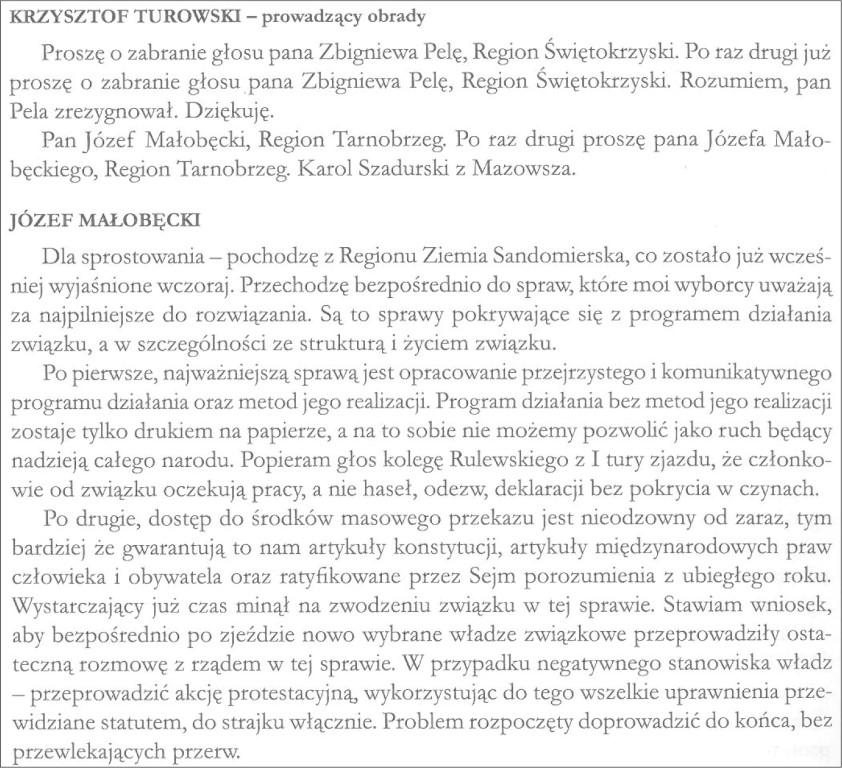
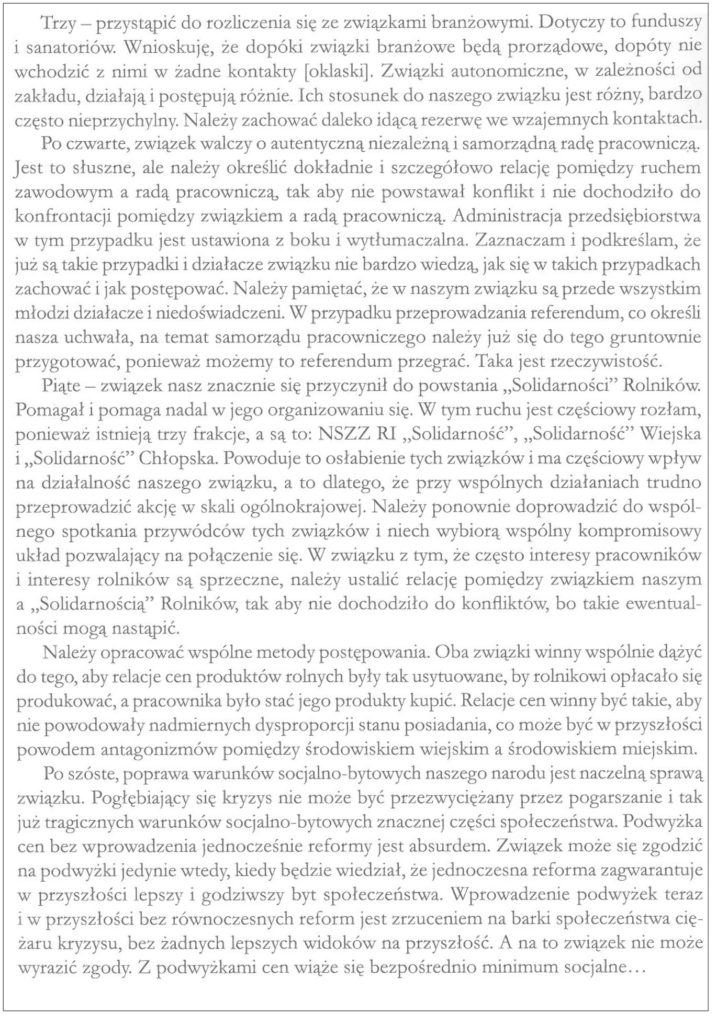
Transcripts from the First Congress of Delegates of the Solidarity Trade Union –
PROGRAM THESES Józef Małobęcki
Józef Małobęcki’s statement “Non-coordination of the activity of NSZZ „Solidarity” with pro-communist unions as long as their activity remains pro-government” was met with great applause by the congress participants. This statement was quoted by the main radio stations in the morning news the next day. The goal of the communist media in this case, as in many similar, was to present the delegates of the congress as typical extremists who did not take into account the socio-political and geopolitical realities.
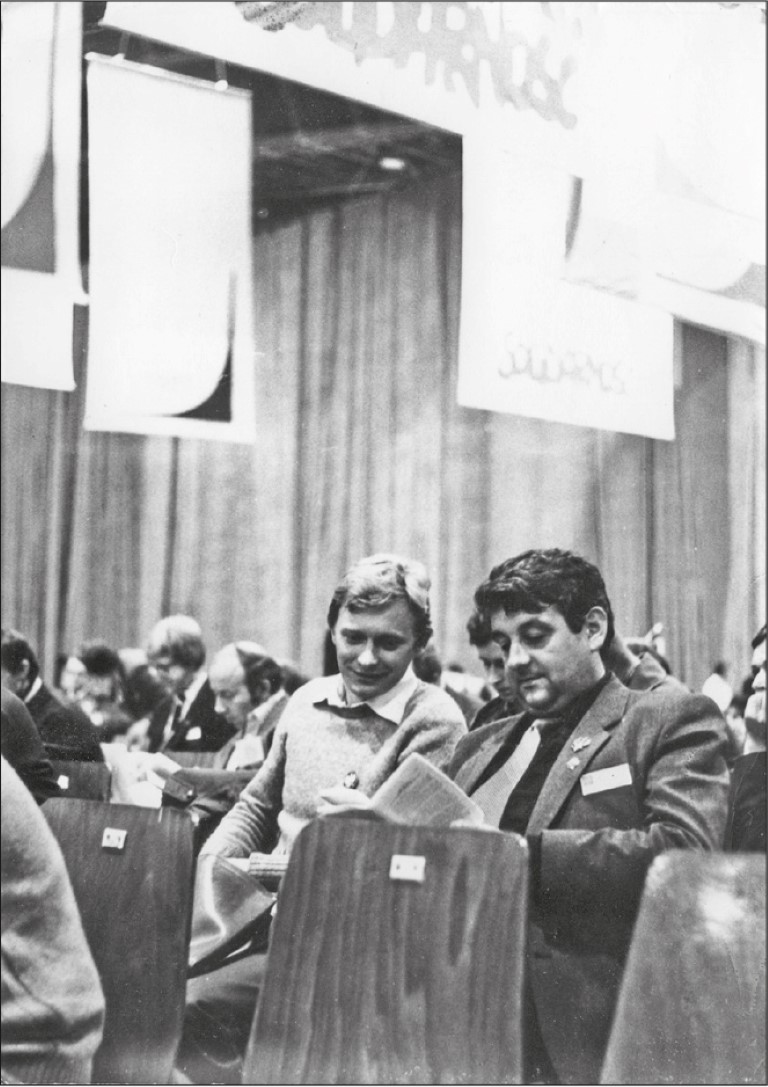
The deliberations of the Congress in Olivia in Gdańsk – Józef Małobęcki and Jacek Kossak review the materials of the Congress.
After voting on resolutions, statements and announcements, the convention proceeded to the election of the president of NSZZ “Solidarity” and the national authorities of the union.
All candidates, both for the presidency and for the national authorities, had 5 minutes to present their vision of the union’s activities in the future.
Candidates for Chairman received:
Andrzej Gwiazda – 74 votes, representing 8.84%,
Marian Jurczyk – 201 votes, constituting 24.01%,
Jan Rulewski – 52 votes, constituting 6.21 %,
Lech Wałęsa – 462 votes, constituting 55.20%.
The undisputed winner of the election was the chairman of the August strikes of Gdańsk Coast, the former chairman of the trade union Lech Wałęsa.
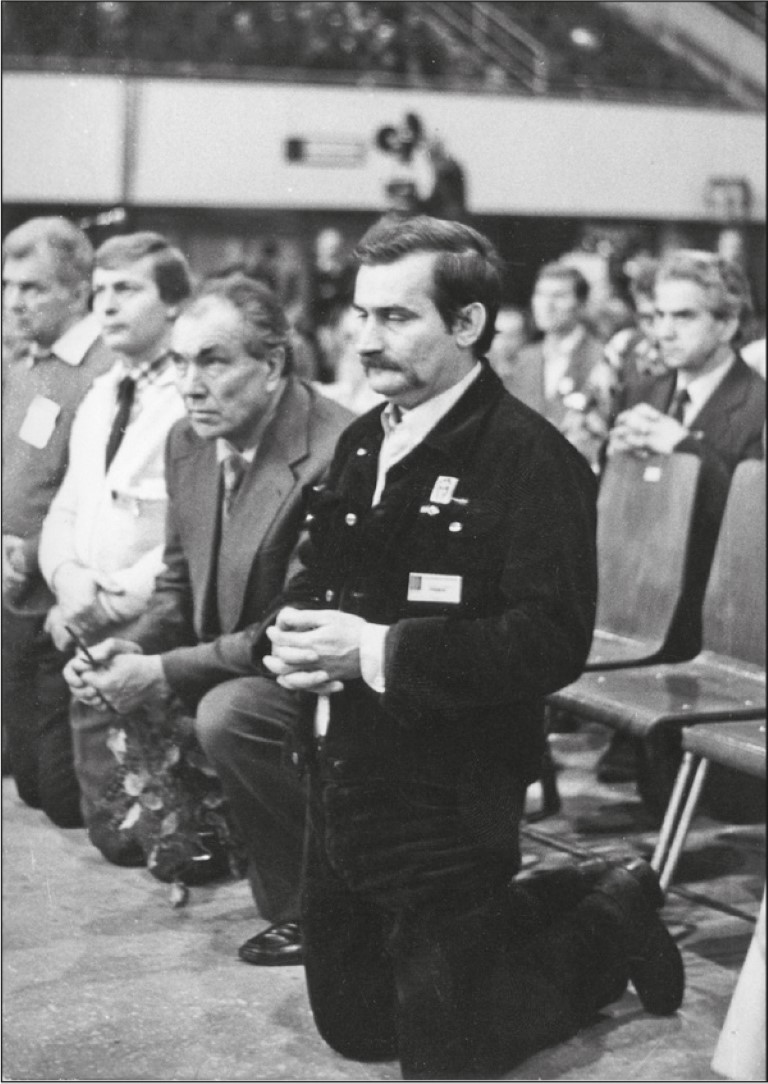
Lech Wałęsa during a mass in the Olivia hall before the next day of the convention.
The election of chairman was followed by the election of the National Audit Committee of the union.
Those elected were:
Jadwiga Szczęskiewicz – Secretary of KKR “Ziemia Łódzka”
Adam Strzembosz – member “Mazowsze”
Andrzej Zarach – member “Dolny Śląsk”
Zbigniew Bełz – member “Gorzów Wielkopolski”
The final round was the election of members of the National Commission of the Solidarity Trade Union.
According to the statutes, the regional chairman automatically became members of the National Commission. The other members of the National Commission were elected by the convention in proportion to the number of union members in the region.
According to the statute, the chairman of the “Sandomierz Land” region, Stanisław Krupka, became automatically a National Commission member. Proportionally to the number of members in the “Sandomierz Land” region he was entitled to one place in the National Commission. Each region elected candidates for the National Commission member from among the delegates of the region in the larger number than the region was entitled to. The increased number allowed the convention the right to choose from among the persons elected by the region to be candidates. From the group of delegates of “Sandomierz Land” region, Kazimierz Rostek from Stalowa Wola and Józef Małobęcki from Staszów were elected. Each candidate of the region had 3 minutes to present himself on the convention forum. Józef Małobęcki was chosen member of National Commission of NSZZ “Solidarity” from region “Sandomierz Land.” The delegate from Staszów representing “Siarkopol” Sulphur Mines in Grzybów and “Staszów Land” in the first fully democratic election in communist Poland was elected to the body representing 10 million people.
Presentation for a member of the National Committee of the „Solidarity” Union
My name is Józef Małobęcki, I am 30 years old, I am married, I have one child. Until I resigned as a trade union, I was a supervisor in the „Siarkopol” sulfur mine in Grzybów.
My union functions: I was one of the five members of the founding committee, I was the secretary for organizational matters. Then I became the deputy chairman of the works committee. Currently, I am also the head of the delegation in the city.
I am not a member of the regional board because I missed the elections in protest about the irregularity of the elections to the regional board. The correctness of my decision was confirmed by the Union National Electoral Commission, which decided with a resolution that the elections in the regional board would be held again. I am a delegate from the by-elections.
Ladies and gentlemen, we are a union movement, and at the same time we are a social self-defense movement. I will now divide these two things partially. First of all, we must not forget that, apart from relationships, we are Poles and this must always be remembered by all of us. I limit myself to relationship matters. First of all, the action program and methods of its implementation. Otherwise, without implementation methods, we will not do anything. I spoke about my attitude to trade unions when I presented the program.
Then, the improvement of social and living conditions. All things are very important: residential health care and so on. The most important thing is to establish a chronology and put it into action.
Information. The speed of information flow is the most important thing in a relationship, as our union members must know directly what is going on in a relationship. The quality of the newsletters is also a very important thing as it is very poor and needs to be improved.
As for the social self-defense movement: there is a further struggle for genuine workers' self-government, defense of human dignity and rights, civil liberties, freedom of opinion and publication.
Transcript from the First Congress of Delegates of NSZZ “Solidarity” – my presentation for a member of the National Commission.
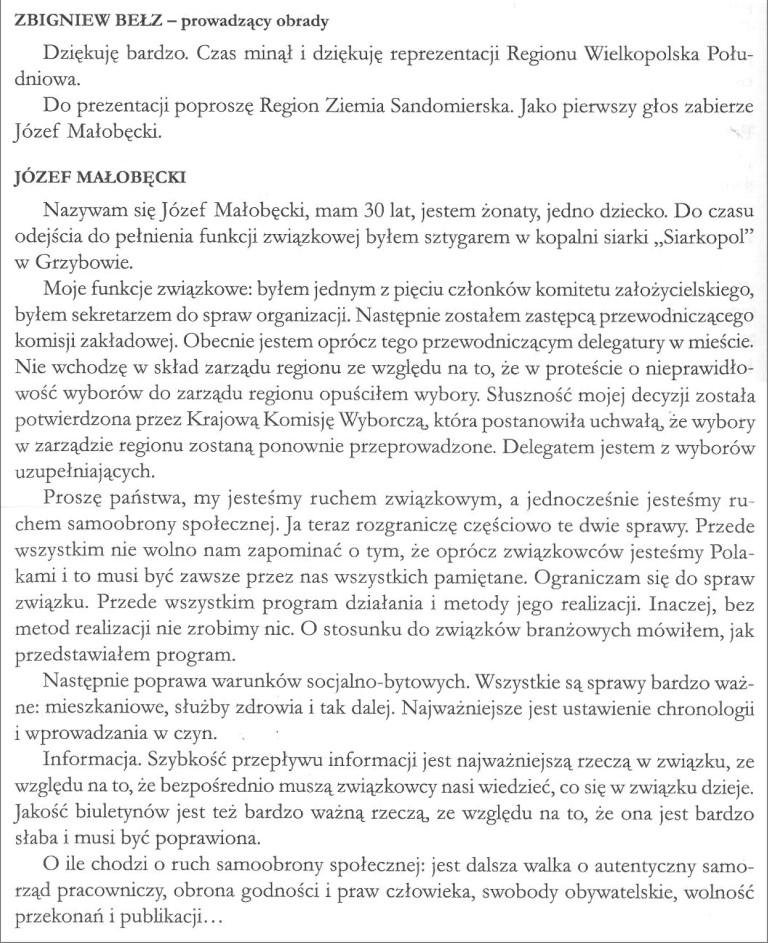
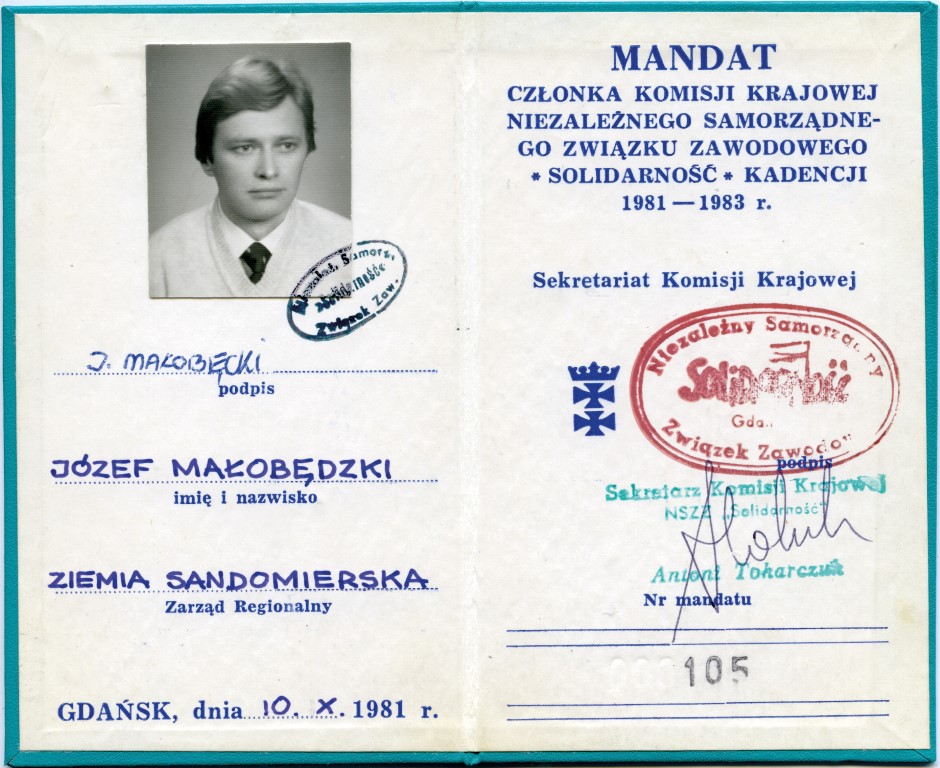
The mandate of the NSZZ “Solidarity” National Commission member
A total of 107 members of the NSZZ Solidarity National Commission from the regions were elected:
Wacław Adamczyk – Greater Poland
Jan Bartczak – Central and Eastern
Lech Biegalski – Pojezierze
Ryszard Bogacz – Western Pomerania
Włodzimierz Bogucki – Łódz Land
Edward Borowski – Gorzów Wielkopolski
Tadeusz Chmielewski – Elbląg
Kazimierz Chrzanowski – Central and Eastern
Andrzej Dudek – Świętokrzyski
Lech Dymarski – Greater Poland
Edward Dzimidowicz – Pobrzeże
Andrzej Gwiazda – Gdańsk
Jerzy Hilbrycht – Podbeskidzie
Ryszard Iwan – Śląsko-Dąbrowski
Stanisław Jałowiecki – Śląsk Opolski
Zbigniew Janas – Mazovia
Maciej Jankowski – Mazovia
Jerzy Jastrzębowski – Mazovia
Marian Jaworski – Świętokrzyskie
Seweryn Jaworski – Mazovia
Tadeusz Jedynak – Śląsko-Dąbrowski
Zbigniew Jędruszewski – Central and Eastern
Józef Jungiewicz – Lesser Poland
Stefan Jurczak – Lesser Poland
Marian Jurczyk – Western Pomerania
Zbigniew Karwowski – Kujawsko-Dobrzański
Tadeusz Kensy – Rzeszów
Czesław Kijanka – Przemyśl
Stanisław Kocjan – Western Pomerania
Zbigniew Kokot – Częstochowa
Anatol Konsik – Gorzów Wielkopolski
Antoni Kopaczewski – Rzeszów
Stefan Korejwo – Słupsk
Patrycjusz Kosmowski – Podbeskidzie
Andrzej Kralczyński – Podbeskidzie
Witold Król – Radom Land
Jerzy Kropiwnicki – Łódz Land
Stanisław Krupka – Sandomierz Land
Mieczysław Kukuła – Toruń
Andrzej Kuźniar – Rzeszów
Marian Kwieciński – Jelenia Góra
Mieczysław Lach – Piotrków Trybunalski
Bogdan Lis – Gdańsk
Edward Łuczycki – Białystok
Jan Łużny – Śląsko-Dąbrowski
Józef Małobęcki – Sandomierz Land
Jacek Marchewczyk – Lesser Poland
Stanisław Marczuk – Lesser Poland
Alicja Matuszewska – Gdynia
Eugeniusz Matyjas – Leszno
Michał Mąsior – Śląsko-Dąbrowski
Paweł Michalak – Pobrzeże
Bogusław Mikus – Chełm
Karol Modzelewski – Lower Silesia
Henryk Napieralski – Bydgoszcz
Eligiusz Naszkowski – Piła
Stefan Nawrot – Lower Silesia
Włodzimierz Nowara – Śląsko-Dąbrowski
Marian Nowicki – Kujawsko-Dobrzański
Stanisław Okoński – Śląsko-Dąbrowski
Mieczysław Oszmian – Zielona Góra
Andrzej Piesiak – Jelenia Góra
Antoni Pietkiewicz – Southern Greater Poland
Michał Powroźny – Warmian-Masurian
Aleksander Przygodziński – Częstochowa
Janusz Rejdych – Śląsko-Dąbrowski
Zygmunt Rolicz – Southern Greater Poland
Zbigniew Romaszewski – Mazovia
Andrzej Rozpłochowski – Śląsko-Dąbrowski
Jan Rulewski – Bydgoszcz
Piotr Rychter – Podkarpacie
Bogdan Rys – Świętokrzyskie
Jan Seń – Lower Silesia
Jan Śliwiński – Greater Poland
Ryszard Stachowiak – Konin
Andrzej Sobieraj – Radom Land
Antoni Stawikowski – Toruń
Franciszek Szelwicki – Śląsk Opolski
Eugeniusz Szumiejko – Lower Silesia
Bogusław Szybalski – Elbląg
Stanisław Szymkowiak – Zielona Góra
Jerzy Teluk – Sieradz
Andrzej Warchałowski – Lesser Poland
Wojciech Wyścicki – Płock
Jan Winnik – Lower Silesia
Henryk Wujec – Mazovia
Zygmunt Zawojski – Podkarpacie
Mieczysław Ziaja – Lesser Poland
Wojciech Zierke – Slupsk
The following became members of the National Commission Presidium:
Lech Wałęsa – Chairman – Gdańsk
Ryszard Błaszczyk – Śląsko-Dąbrowski
Zbigniew Bujak – Mazovia
Władysław Frasyniuk – Lower Silesia
Andrzej Konarski – Lower Silesia
Mirosław Krupiński – Warmian-Masurian
Jacek Merkel – Gdańsk
Janusz Onyszkiewicz – Mazovia
Grzegorz Palka – Łódź
Józef Patyna – Śląsko-Dąbrowski
Grażyna Przybylska-Wendt – Plock
Zdzisław Rozwalak – Greater Poland
Wacław Sikora – Lesser Poland
Andrzej Słowik – Łódź
Leszek Waliszewski – Śląsko-Dąbrowski
Jan Waszkiewicz – Lower Silesia
Stanisław Wądołowski – Western Pomerania
Antoni Tokarczuk – Bydgoszcz
The union’s national election, constitution, and program resolution obligated the union to continue its work for the state and nation.
The first period of creating and strengthening the power of the union was over. A new period of struggle for increasing the scope of freedom in its broadest sense was opening, as well as for the prospective improvement of the nation’s living conditions, which it deserved despite its tragic history. There was a great breach in the hitherto communist structure, which would and had to blow the whole system apart. Like every day of the congress, the last day ended with the solemn singing of a song ‘God save Poland’.
Immediately after the First National Congress of NSZZ “Solidarity,” provocations of the communists against the union intensified. There was a strike threat in one of the State Agricultural Farms in Zielona Góra Voivodeship, where the strike committee was disciplinary dismissed from work. This was an action contrary to existing legislation. The PGR staff responded with a strike. The stiff position of the communists did not allow a compromise to be reached.
The rector of the Radom School of Engineering was appointed without the consent of the University Council, to which the Independent Students’ Union, ideologically linked to the Solidarity Trade Union and supported by the union, responded with a strike. Arrests of trade unionists and opposition activists from anti-communist political groups followed. Talks with the government were often broken under false pretences, and agreements that had been made earlier were not implemented by the government.
The National Committee of “Solidarity” had to work out a new strategy and tactics of action. For this purpose a National Commission meeting was called in Gdańsk. Józef Małobęcki and Kazimierz Rostek, who replaced Stanisław Krupka, went to the meeting. The meeting was characterized by the will to remain steadfast against communist provocative actions.
Sometimes it was possible to sense the unjustified arrogance of speeches. Józef Małobęcki spoke during the meeting, warning the union against complacency and overestimating its own strength. In order to take the propaganda weapon out of the communists’ hands in the media who blamed the union for the shortages of everyday products caused by the strikes, the chairman of the “Mazovia” region, Zbigniew Bujak, put forward a proposal to carry out future strike actions in the armaments plants. This would take away the communists’ argument that market shortages were caused by strikes in plants working for the market. This proposal was accepted by the National Commission members with mixed feelings. During the meeting, further union action was passed in a situation of escalating tension, as well as a resolution forbidding strike action anywhere in the country without prior permission from the National Commission union. This was to prevent succumbing to the provocative actions of the communists, the existence of which was suspected by the National Committee.
At that time, the already difficult-to-bear supply shortages in the Tarnobrzeg Voivodeship worsened drastically. Even the radio reported on these difficulties, citing statistics about the worst supply situation in Poland, which occurred in this particular province.
The Communists’ next provocative action was aimed at stirring up a flashpoint. The public outcry caused by a lack of adequate supplies was to lead to a strike, which was to be used as propaganda against the “destabilizing and destructive” policy of the union, regardless of the worsening economic situation in the country. The agitation in the society of Tarnobrzeg Voivodeship also concerned the erroneous and inefficient staffing of positions in the Voivodeship, for which the Voivode Władysław Bobek was personally accused. Conflicts between the crews of many companies and their managers also contributed to the dissatisfaction of the province’s residents. These managers were accused of lacking managerial skills, leading to the ruin and bankruptcy of the company, mismanagement of the entrusted property, corruption and using their positions for personal purposes, as well as taking advantage of privileges due to their positions. At the last National Commission meeting it was decided not to take strike action for two reasons. These reasons included:
- The union was preparing for talks with the government on issues that troubled the whole society at that time, which had to be settled in the shortest possible time.
- Serious strikes were nothing but provocations used by the communists for propaganda purposes, aimed at compromising and discrediting trade union bodies, both in the eyes of Polish society and Western societies sympathetic to the union.
The greatest pressure to launch the strike action came from the union members from the plants in Stalowa Wola, Sandomierz, Nowa Deba. However, the regional authorities, in spite of legitimacy of problems raised, did not give their consent to the strike, referring to the statement of the National Committee of the Union. In response the trade unionists announced that they would organize such a strike themselves in case of a negative stance of the regional authorities. The regional authorities could not agree to such a situation undermining the authority of management board as a body disregarding the demands and votes of its own members. Therefore, the Regional Board organized a meeting of the union representatives from the whole voivodeship to discuss the problems and to take a stand on a possible strike of the “Sandomierz Land” Region. This meeting, because of the trade union functions, was attended by Józef Małobęcki, who led the minority group opposing the strike action. The position of the minority group against the strike action was dictated by three reasons:
- The National Commission’s position was unequivocal on strikes.
-
Lack of confidence in the ability to organize and prove the allegations against the provincial office or individual executives.
- Lack of sufficient preparation and having undeniable facts at their disposal.
After a heated and aggressive discussion, endless as usual, a vote was finally taken, which the minority group lost. It was decided to issue a demand to the government party to enter into negotiations concerning the difficulties of supply and the violation of law by communist prominents in the province.
For obvious reasons the government party did not react, ignored the demands of trade unionists and the strike in the Tarnobrzeg province began. The seat of strike’s authorities under the leadership of Janusz Kotulski, the chairman of Steelworks-Stalowa Wola union, was the building of Culture House in Stalowa Wola. This building was occupied by the Strike Committee throughout the strike. According to the arrangements each company or region of the “Sandomierz Land” Region was supposed to prepare problems and demands to be settled to the Strike Committee, as well as evidence of mismanagement or breaking the law.
The Staszów Land Coordination Committee was not able to organize and prepare the necessary documentation in such a short time, agreeing with the Regional Board that after the strike action was over the Staszów Land Coordination Committee would conduct separate talks concerning Staszów plants and Staszów itself with the provincial authorities later. The Staszów plants did not actively participate in the strike, limiting themselves to flagging work establishments. In the Sulphur Mine in Grzybów the participation in the strike came down to longer breaks during the day. During these breaks Józef Małobęcki was familiarizing the crew with the Union’s Programme Resolution, using the plant radio for this purpose.
The strike action in Tarnobrzeg lasted over two weeks until the arrival of Solidarity chairman Lech Wałęsa to Stalowa Wola. Due to his arrival, a crowd of several thousand people gathered in front of the Culture House. Lech Wałęsa convinced the strike authorities to suspend it, at the same time assuring them that he would put personal pressure on the government to enter into talks with the Strike Committee. The Strike Committee did not agree to a cessation of the strike action, motivating this with the will to represent the union members’ demands and referring to the vote held among the delegates of the enterprises’ crews. After such a statement of the Strike Committee, Lech Wałęsa proposed to conduct a vote for a strike suspension among the crowd of people. This was the right thing to do, although it was completely contrary to the union’s statute.
The indefinitely prolonged strike action with no prospects of negotiations with the government not only had no solution to problems of the Tarnobrzeg Voivodeship but actually had a negative influence on the mood of Strike Committee, the striking crews and the whole society of the Voivodeship. After his talk with the Strike Committee, Lech Wałęsa went out onto the balcony of the Culture House and addressed the gathered people. At the end of his speech, using his authority and charisma, he initiated a vote to end the strike. This vote had nothing to do with the statutory vote. No ballot-counting committee was appointed, no one counted the votes. The counting of votes consisted of a visual count of the majority of raised hands. The majority voted to end the strike in the Tarnobrzeg Voivodeship. The results of such a vote, despite the procedural inconsistencies envisaged by the statute, were accepted by everyone with undisguised relief. Two weeks of mental tension and physical exhaustion, sleeping in sleeping bags, under blankets, on makeshift couches, on the floor, lack of bathrooms, “dry” food did not have a positive influence on the physical and mental condition of the Strike Committee. Moreover, the overwhelming psychological tension caused by the responsibility for the further development of events was unavoidable in such circumstances. Despite the end of strike, the Strike Committee did not disband, still waiting for the promised intervention of Lech Wałęsa and the arrival of government delegation. Immediately after voting to end the strike, Lech Wałęsa went on his way back to Gdańsk because in two days’ time another session of the National Committee was to take place in which the Committee was to deal with the constantly deteriorating social and political situation in the country.
The political struggle of communists against the union intensified, leading to its destruction. Provocations, arrests, and the refusal to hold or break off talks with the union became a common occurrence. On top of that, there were ruthless, fabricated propaganda attacks on the union through the communist-controlled media. It should be recalled here that the union, fulfilling the programmatic resolution of the congress, constantly demanded access to the mass media, but with few exceptions, despite prior agreements, could not access them. What they managed to convey was censored and often manipulated, taken out of context. It is worth quoting here the statement of one of the “hard-headed” prominents of the Central Committee of the Polish United Workers’ Party, Stefan Olszewski, who knowing very well the power of media to influence society, said memorably: “The party can give up many things, but it will never give up the disposal of mass media.”
Lech Wałęsa was followed by Stanisław Krupka and Józef Małobęcki, members of the Sandomierz Land National Commission of the Solidarity Trade Union.
In accordance with the professed idea of the union, the sessions of all trade union bodies were open to the public with a valid entry pass, especially for journalists from Poland and abroad. During the sessions Lech Wałęsa strongly criticized the uncontrolled strikes, including the strike in the Sandomierz region, questioning the organizational skills of strike committee and their insufficient preparation for negotiations.
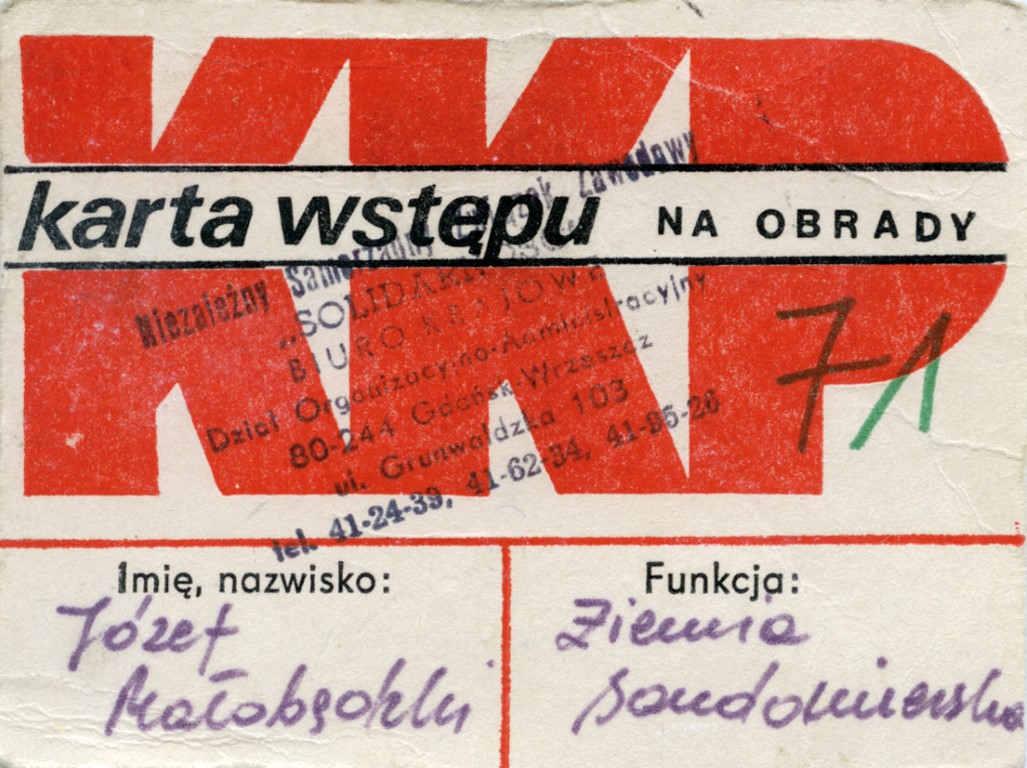
Entry card for the sessions of the National Committee of the union
There was much right in the union chairman’s statement. However, Lech Wałęsa did not know the details of all the conflicts in Tarnobrzeg Voivodeship, nor the effort and determination of the people initiating the strike and commitment of the entire Strike Committee, which did not avoid the shortcomings typical of such an event. His critical speech during the debates, which were closely followed by the communist media hostile to the union, was a bit tactless with regard to both the Strike Committee and the strikers. Józef Małobęcki defended the dignity and honor of the Sandomierz Land trade unionists, accusing Lech Wałęsa of not taking an earlier interest in the situation in Tarnobrzeg Voivodeship (Wałęsa’s trip to France) and, already during the strike, of not supporting the union’s advisors and experts who left the strikers on their own. A harsh exchange of opinions broke out, which was interrupted by the chairman of the session, Wacław Sikora, the chairman of “Lesser Poland” region. However, at the same time it was agreed that after the National Commission session a selected member of the National Commission presidium would go to the region with Stanisław Krupka and Józef Małobęcki, who were returning there. Already after the meeting, in a direct conversation with Lech Wałęsa, the chairman of the union chose Bogdan Lis, experienced in negotiations during the August strikes in 1980 in Gdańsk Shipyard. After arriving in Stalowa Wola, Bogdan Lis was not too satisfied with the collected documentation of the Strike Committee. Despite that he presided over negotiations with the Government Commission that came the next day.
Knowing already the decisive and implacable attitude of the government towards the union’s demands and postulates, the goals achieved by the strike committee turned out to be half-way. The government party only promised to improve the provision of services in the province (it did improve), but the provincial governor was not dismissed from his post (he was dismissed immediately on the first day of martial law), promising to respond later to the accusations raised in the so-called law-and-order issue. It was clear what could be expected from such promises. This is how the strike in the “Sandomierz Land” region ended.
November 11 was approaching, another anniversary of Poland’s regaining independence in 1918, after more than 120 years of captivity. Celebrations of such a momentous anniversary had been forbidden by the communists so far. This time, in spite of the prohibitions, the whole Poland, including “Staszów Land,” was preparing to solemnly commemorate this day. The celebration in Staszów was combined with the transfer of a statue of the national hero Tadeusz Kościuszko from the bushes of church cemetery to the market square. At the end of 1960s, the monument was moved from its former location (at Krakowska Street, a little lower than the present post office) to the bushes of church cemetery. It was difficult for authorities to find a more “prominent” place in Staszów. The ceremony was organized by the Staszów Guild of Various Crafts, the Democratic Party, and the „Staszów Land” Solidarity Coordination Committee.
The momentous ceremony, attended by the Sandomierz-Radom bishop Edward Materski, the vice-voivode of Tarnobrzeg and the deputy head of town, Tadeusz Mordas, took place on the market square in Staszów and gathered crowds of inhabitants. The commemorative speech on the part of the Local Coordination Committee “Staszów Land” was given by a member of the union acting in the Health Care Institution, Maciej Zarębski, doctor of medicine.
At the same time, the mine’s long-time director, Franciszek Nadrowski, retired early. The reasons for his resignation were the atmosphere of continuous conflict, the tense situation in the country, and probably the recent events at the mine. The early retirement of the deputy director for economic affairs triggered a dispute over the position. Members of the mine’s highest trade union authorities took part. The position was filled by director Franciszek Nadrowski, but not to their satisfaction. The conflictual situation in the country and the recent events in the mine were probably the reasons for Franciszek Nadrowski’s retirement.
Traditionally, the beginning of December marks the beginning of Barbórka, the miners’ holiday. The mine management also invited the mine’s “Solidarity” to the official celebrations. The official part was held at the Culture House in Staszów. Due to Bolesław Kozłowski’s illness, the union was represented by Józef Małobęcki, who took a seat next to Franciszek Nadrowski, also invited to the ceremony. During the presentation of awards and medals, Director Franciszek Nadrowski said: “I have seen it so many times and it takes quite a long time, so it is worth shortening this ceremony with a cigarette” he invited Józef Małobęcki for a cigarette backstage. The conversation focused on recent events at the mine and, above all, events in the country.
Unexpectedly, director Franciszek Nadrowski addressed his interlocutor with the following words: “Mr. Józef, from my many months of observing you, it seems that you are probably one of the few in the mine’s “Solidarity” who cares about something more than personnel reshuffling. Times are getting more and more difficult, the socio-political situation looks extremely confrontational, threatening to explode incalculably at any time. If a situation arises in which you need shelter, come to me and I will hide you at my place.” This unusual statement, its form, and such an unexpected proposal took director Franciszek Nadrowski by surprise. Józef Małobęcki was considered by the mine management as one of the most active, radical and confrontational “Solidarity” activists. The statement of this kind addressed to him by the director of company, with whom he often had strong confrontational clashes, caused total consternation in Józef Małobęcki. In an awkwardly worded expression of gratitude, he merely asked what about the rest of those potentially at risk. In reply he was told that: “in case of bestowing unquestionable confidence on them, no more than 2-3 persons can be hidden by him for some time.” It was a particularly praiseworthy attitude. Józef Małobęcki was not able to take advantage of this offer. His fate turned out differently. After six months of forced isolation, Józef Małobęcki was invited to the home of director, with whom they spent a pleasant evening discussing the further development of the situation. This discussion was attended by a great supporter and union member, the director’s wife, Barbara.
In the first days of December the Local Coordination Committee of “Staszów Land” prepared for the next task. It involved talks, previously agreed with the Regional Board, between the Local Coordination Committee and the Provincial Office and the Town and Commune Office in Staszów. The talks were to concern the situation of town and its residents, which according to the earlier arrangements were not the subject of strike in Tarnobrzeg Voivodeship. The deputy governor of the Tarnobrzeg Voivodeship came to the talks especially for that purpose. On the part of the Town and Commune Office these talks were attended by the deputy head, Tadeusz Mordas. The Staszów Land Coordination Committee was represented by: Józef Małobęcki, Bolesław Zabranny, Andrzej Kodym, Stanisław Świerszcz, Andrzej Ptak, Czesław Kaszluga.
The talks lasted from 9 a.m. to 1 a.m. the next day. The deputy governor wanted to include representatives of Staszów supply companies in the talks, to which the unions refused, claiming that previous discussions with the representatives of GS, PSS and WPHW had not brought any positive results. After this vetum the deputy governor refused any talks, motivating his refusal by the lack of knowledge of all subjects.
In response, the union representatives stated that as he was not prepared for the talks and did not have the authority to make decisions, the talks were pointless. After a longer discussion, the deputy provincial governor agreed to hold talks concerning Staszów and its inhabitants, and to set a deadline for implementing the agreed recommendations.
The discussions mainly concerned the negligence of supply, economy and construction. At the forefront of omissions prepared by the District Commission were the following problems to be solved:
- Improving supplies in all industries.
- Increasing funding for the city.
- Increasing funding and accelerate the completion of the Staszówek Primary School.
-
Accelerating the development of a newly created park on the estate opposite the canteen of the sulphur mine.
-
Building of additional kindergarten in Staszów.
-
Considering the possibility of building a nursery school in Staszów.
-
Building of a safe passage for pedestrians on the bridge at Krakowska Street.
- Finishing of the renovation of the town hall in the market square, which lasted for many years.
At the end of discussions, a protocol was signed indicating the deadlines for implementation of the joint agreements.
The atmosphere of confrontation between the union and the communists threatened with loss of power was reaching its zenith. A strike broke out at the Higher School of Firefighting in Warsaw. The communists used force to pacify and occupy the school. It was a prelude to a violent confrontation with the union. Subconsciously, it was possible to feel the atmosphere of danger and of a decisive conflict and its solution. For several months, military commissars sent by Wojciech Jaruzelski had been operating in major administrative units in Poland. Such a commissar was also active in the Town and Commune Office in Staszów.
Another meeting of the National Solidarity Commission in Gdańsk was approaching. A few days before the National Commission meeting, the Commission presidium met only with the regional chairmen in Radom. This time, due to the seriousness of situation, Lech Wałęsa was to express in secret deliberations with the words “chopping off with an axe the heads of all those who take a moderate approach to the agreement with the government.”
A prepared tape of this statement taken out of context was broadcast by all radio and television stations in repeated cycles and described by the communist press. By manipulating the coverage of Radom meeting, the communists made the society believe that the leaders of trade union had extreme and confrontational aspirations against the people’s power and the existence of state. This was the atmosphere in which the two-day National Commission meeting in Gdańsk began on Friday, December 11. Due to the safety of the national authorities, the meeting was held in the already historic OHS hall in the Shipyard. It was the same hall where the August Agreements were signed in 1980, starting the legal activity of the first independent, self-governing trade unions in the communist camp.
The National Commission deliberations addressed 3 primary issues:
- How and who among the participants of the Radom meeting handed over the tape to the Security Service.
- Advisability of making any further attempts to communicate with the government when all attempts to initiate such talks are smashed by a wall of ignorance and arrogance.
- Further action by the union in the situation of political stalemate.
At that time, it was impossible to establish the circumstances in which the Secret Service came into possession of the recording of Radom meeting (today it is known that the chairman of the Piła Region, Edmund Naszkowski, was a Secret Service mole in the union’s highest authorities). The other two issues were inseparable. Union advisors and experts spoke, alternating with members of the National Commission. Most of them stated, supported by facts, that further negotiations with the government were pointless, because the government and the parliament, which was subordinated to the communists, were pursuing a policy that was contrary to the interests of the Polish people and the state, hence the need for further talks and negotiations became pointless. The motion for a trade union resolution defining the current social and political situation and the position of NSZZ “Solidarity” regarding this situation was prepared jointly by the Bydgoszcz Region chairman, Jan Rulewski, and the deputy chairman of the “Lower Silesia” Region, Karol Modzelewski. The resolution fully and unambiguously blamed the communist factors for the existing social and political situation. At the same time, it called on the union to demand that free democratic elections be held for the Sejm – the highest constitutional authority in Poland, which until then had been a helpless, subordinate and obedient tool in the hands of communist power. The resolution was passed by an overwhelming majority of votes.
When observing Lech Wałęsa during the whole debate, it was possible to notice his concentration and concern, instead of his typical enthusiasm and feistiness. He rarely spoke, rather listened to the speeches of others. It was clear that he was extremely depressed, distressed and worried about the further consequences of the discussion and the adopted resolution. The members of the National Committee were aware of the importance of resolution. As never before, the union openly questioned not only the legality of ruling communists but also the supreme constitutional authority subordinated to them – the Seym. Only the Seym could control the actions of the government, which, for obvious reasons, it did not do.
The union could not react to the situation in any other way. The refusal to hold talks under any pretext, the constant withdrawal from previously made agreements, the incessant provocations, the arrests of activists at various levels throughout the country, made it impossible to carry out statutory activities. These actions also made it impossible to implement the programme resolution of the Congress, putting the union in a situation of organizational inertia. This was accompanied by vicious and ruthless propaganda of the communist mass media against the union, falsifying facts and presenting fabricated statements of activists taken out of context. The vilification and discrediting went so far that the ancestors of some leading activists were called Volksdeutsche.
This was the atmosphere in which the session of the Solidarity National Commission was held in Gdańsk. Probably the last motion passed by the National Commission was a motion not to conduct National Commission sessions on the day preceding any holiday, because of the safety of the highest union authority, which was the National Committee. The security of the union could only be guaranteed by the work crews who were at their work stations. It was decided not to repeat this violation ever again. After this motion was voted through, there was a strange, incomprehensible rush to leave the meeting room. There was a subconscious feeling of some kind of threat. Perhaps the last words heard from Lech Wałęsa were: “Don’t be in such a hurry. Telephones and telexes are already cut off.”
The session ended at 1:30 a.m. on December 13.